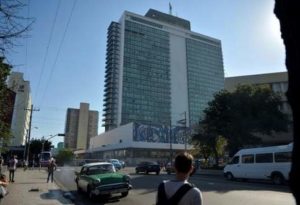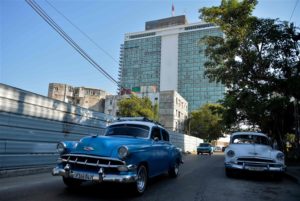 HOTELES ESPAÑOLES EN CUBA QUE SE VERIAN AFECTADOS POR LA LEY NORTEAMERICANA HELMS-BURTON.
HOTELES ESPAÑOLES EN CUBA QUE SE VERIAN AFECTADOS POR LA LEY NORTEAMERICANA HELMS-BURTON.
Veinte hoteles españoles en Cuba están en riesgo por el embargo de EEUU.
Casi una veintena de hoteles de cadenas españolas en Cuba se podría ver afectada por la activación del Título III de la ley Helms Burton de Estados Unidos contra la isla caribeña tras veinte años suspendida y que permitirá reclamar por las propiedades que fueron expropiadas por el régimen castrista.
Según el Gobierno norteamericano se podrían ver perjudicados al menos seis inmuebles que albergan establecimientos turísticos de Iberostar, otros 11 de Meliá (incluyendo los Paradisus) y los cuatro de H10. Todos estos hoteles están en régimen de gestión o copropiedad.
Las compañías hoteleras son las empresas españolas con más presencia en Cuba. Se estima que hay un total de 270 presentes en la isla caribeña. En concreto, de entre las mayores firmas turísticas, Meliá gestiona 39 establecimientos y recientemente ha firmado un acuerdo con el Gobierno cubano para renovar las licencias hasta 2042 con una inversión prevista de 350 millones. Por su parte; Iberostar cuenta con 14 hoteles, mientras que H10 tiene 4; Barceló gestiona tres mediante un acuerdo con Gran Caribe; y Globalia y NH, dos cada una. Cuando EEUU puso en marcha la ley se estimó que podrían recibirse 200.000 demandas en los juzgados estadounidenses por parte de ciudadanos que ahora viven en Norteamérica.
Desde las empresas quitaron hierro a las posibles consecuencias de la activación de este aumento de las hostilidades de EEUU contra Cuba, ya que en buena parte de estos negocios son meros administradores. De hecho, Meliá lanzó un comunicado señalando que no tiene bienes que pudieran ser objeto de reclamación en Cuba tras abrir las autoridades estadounidenses el camino a posibles confiscaciones de activos de empresas extranjeras en la isla.
“Confirmamos la no propiedad de Meliá de bienes o participaciones de bienes que pudieran ser objeto de potencial reclamación tras su expropiación en la década de 1960, y afirmamos que, de dirigirse alguna reclamación contra algún hotel, nuestro papel sería el de meros gestores hoteleros, con un rol equivalente al del resto de actores de la cadena de valor del negocio turístico”, señaló la española, que opera desde hace 30 años en Cuba.
Otras como NH han descartado que la aplicación total de la ley vaya a afectar a su negocio puesto que, al menos en el caso de esta cadena, sólo operan dos hoteles en la isla en régimen de gestión y aseguran que no tienen grandes inversiones realizadas. En este punto, señalan que las reclamaciones irían contra los propietarios de los edificios.
Sin embargo, la ley Helms Burtun, que fue aprobada por EEUU en 1996, abre la puerta a que tanto propietarios de los inmuebles como las empresas que explotan los mismos puedan recibir una demanda. Según destaca el abogado José Antonio de Alarcón, de Hosteltur, la decisión de la Administración de Donald Trump “deja la puerta abierta a que cualquier persona física o jurídica que crea que un activo suyo – un inmueble o algún derecho que tuviera de alguna sociedad que tuviera propiedades, o una empresa, una fábrica, un hotel,… Cualquiera que antes del año 1959 – tuviera algo que el régimen castrista hubiera confiscado, tiene ahora derecho a presentar una reclamación de daños y perjuicios contra quien actualmente lo explote, puesto que allí todo es de propiedad estatal en su mayor parte”.
El Gobierno de Trump llevaba semanas amenazando con la posibilidad de activar esta normativa, que tiene entre otros fines el castigo al régimen venezolano de Nicolás Maduro, muy dependiente de Cuba. Hay que tener en cuenta que muchas de las propiedades que fueron confiscadas son ahora de titularidad estatal.
La decisión de activar la normativa el próximo día 2 de mayo no ha sentado nada bien a la Unión Europea, por los intereses que las empresas del viejo continente tienen en la isla caribeña.
 SPANISH HOTELS IN CUBA THAT WILL BE AFFECTED BY THE NORTH AMERICAN LAW HELMS-BURTON.
SPANISH HOTELS IN CUBA THAT WILL BE AFFECTED BY THE NORTH AMERICAN LAW HELMS-BURTON.
Twenty Spanish hotels in Cuba are at risk from the US embargo.
Almost a score of hotels of Spanish chains in Cuba could be affected by the activation of Title III of the Helms-Burton law of the United States against the Caribbean island after twenty years suspended and that will allow claiming for the properties that were expropriated by the Castro regime.
According to the US Government, at least six properties that house Iberostar tourist establishments, another 11 from Meliá (including the Paradisus) and four from H10, could be affected. All these hotels are under management or co-ownership.
The hotel companies are the Spanish companies with the most presence in Cuba. It is estimated that there are a total of 270 present on the Caribbean island. Specifically, among the largest tourism firms, Meliá manages 39 stores and recently signed an agreement with the Cuban government to renew licenses until 2042 with an expected investment of 350 million. On the other hand; Iberostar has 14 hotels, while H10 has 4; Barceló manages three through an agreement with Gran Caribe; and Globalia and NH, two each. When the US launched the law it was estimated that 200,000 lawsuits could be received in US courts by citizens now living in North America.
From the companies, they removed iron to the possible consequences of the activation of this increase of the hostilities of the USA against Cuba, since in good part of these businesses they are mere administrators. In fact, Meliá released a statement saying that it has no assets that could be subject to a claim in Cuba after the US authorities open the way to possible confiscations of assets of foreign companies on the island.
“We confirm Meliá’s non-ownership of goods or participation of property that could be subject to potential claim after its expropriation in the 1960s, and we affirm that, if a claim is made against a hotel, our role would be that of mere hotel managers, with a role equivalent to that of the other actors in the tourism business value chain, “said the Spaniard, who has been operating in Cuba for 30 years.
Others such as NH have ruled out that the total application of the law will affect their business since, at least in the case of this chain, only two hotels operate on the island under management and ensure that they do not have large investments made. At this point, they point out that the claims would go against the owners of the buildings.
However, the Helms-Burton law, which was approved by the US in 1996, opens the door for both property owners and the companies that operate them to receive a demand. According to the lawyer José Antonio de Alarcón, of Hosteltur, the decision of the Administration of Donald Trump “leaves the door open to any natural or legal person who believes that an asset of his – a real estate or any right he had of any company that had property, or a company, a factory, a hotel, … Anyone who before 1959 – had something that the Castro regime had confiscated, now has the right to file a claim for damages against whoever actually exploits it, since that there everything is state-owned for the most part. ”
The Trump government had been threatening for weeks the possibility of activating this regulation, which has among other purposes the punishment of the Venezuelan regime of Nicolás Maduro, very dependent on Cuba. Keep in mind that many of the properties that were confiscated are now state-owned.
The decision to activate the regulations on May 2 did not sit well with the European Union, because of the interests that the companies of the old continent have on the Caribbean island.
Agencies/ ElEconomista, Spain/ Fernando Tadeo/ Excerpts/ Extractos/ Internet Photos/ Arnoldo Varona/ www.TheCubanHistory.com
THE CUBAN HISTORY, HOLLYWOOD.



 < SPANISH HOTELS in Cuba that will be Affected by the American law Helms-Burton.
< SPANISH HOTELS in Cuba that will be Affected by the American law Helms-Burton.





